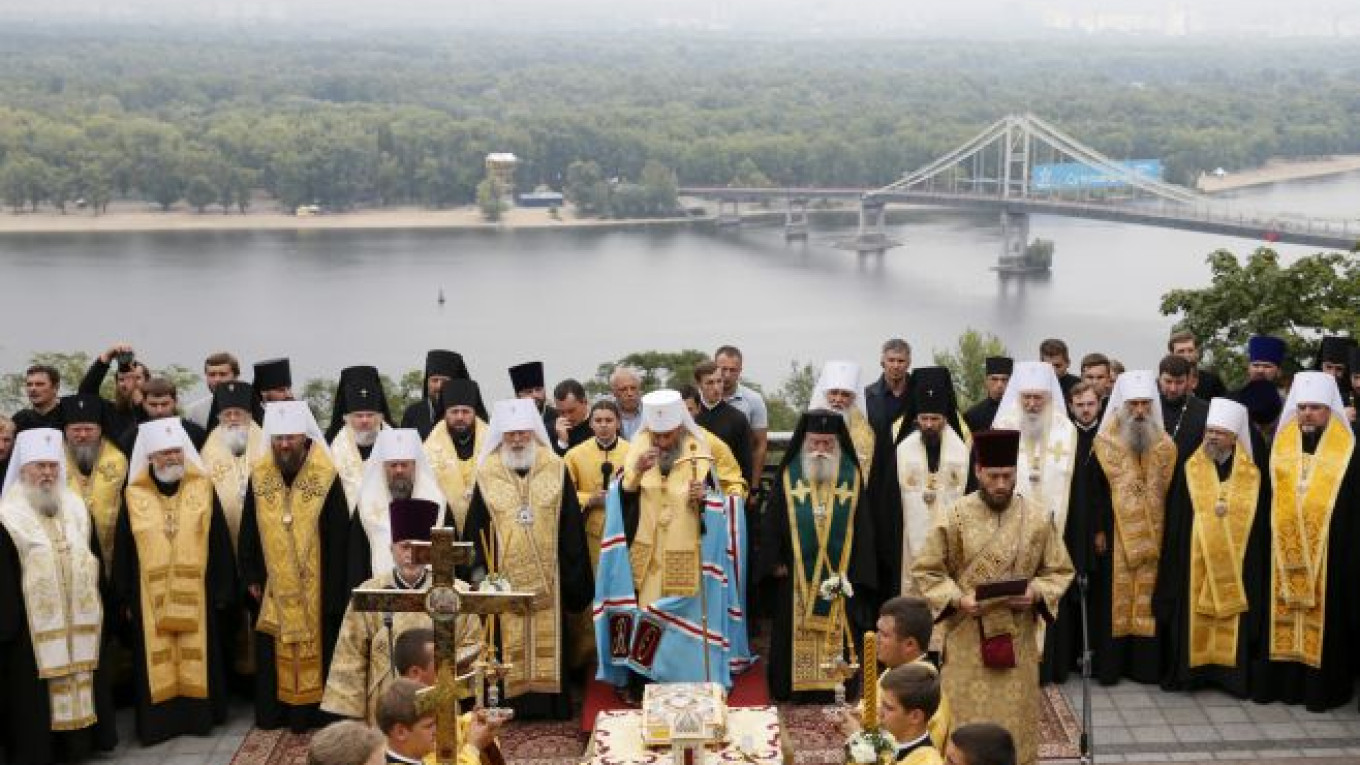More than 400 politicians, public figures and religious leaders gathered in the Kremlin on July 28 to commemorate 1,000 years since the death of Prince Vladimir, the ruler of Kievan Rus who converted Slavs to Orthodox Christianity. The event wouldn't have drawn much public attention if it weren't for the significance of Prince Vladimir's personality in Moscow's political agenda since the Ukraine crisis began.
As part of the celebrations, the Russian authorities went so far as to decide to erect a 25-meter monument to Prince Vladimir. The decision to erect the monument at Vorobyovy Gory (Sparrow Hills), an observation deck popular with local residents as well as tourists, received a mixed reaction in Moscow.
Some 60,000 people signed a petition against the installation of the monument. Yet the plan that has gained high-profile support among politicians as well as the Russian Orthodox Church is set to go ahead with the exact location still under discussion.
Kiev is home to another monument to Prince Vladimir, which is more than 150 years old. If built, the Moscow monument will be considerably taller than the one in Kiev.
This race underpins a new round of rivalry between Russia and Ukraine, albeit in the cultural, not military, domain. Prince Vladimir seems to have become the centerpiece of this recent spat, with both Russia and Ukraine trying to lay claim to their shared past.
The goal that the Russian government is pursuing through the grand celebration of Prince Vladimir is to cement Russia's roots in Kievan Rus.
The Russian state originates in Kiev, the capital of present-day Ukraine. Moscow is attempting to ideologically separate the history of what used to be Kievan Rus from the history of Ukraine.
The importance of Kievan Rus to modern Russian history is hard to overestimate. During this period, loosely from 882 to 1240, the Slavs were converted to Orthodox Christianity. Kievan Rus is also a symbol of the struggle against the Mongols who invaded the country in the 1240s and to whom it remained in submission until the mid-15th century.
The new trend in Russian politics aims to separate the history of Kievan Rus from today's Kiev in an attempt to monopolize the most important piece of history that the two countries share. Proponents of this idea appeal to the "Tale of Bygone Years," a collection of texts compiled in Kiev in 1113 that interpret the history of Eastern Slavs in the 9th-11th centuries and serve as an important source of information to historians.
Russian Patriarch Kirill recently said that there is no mention of Belarus, Russia or Ukraine in the "Tale of Bygone Years," yet there is an all-encompassing ''Russian world.''
"The Russian world is the Ukrainian world and the Belarussian world at the same time. It is an all-Rus world. The world that was created through baptism in the river, the world of Prince Vladimir," he said.
The patriarch referred to this particular line from the historical texts: "These are the tales of the bygone years, whence is come the Russian land," which refers to Kievan Rus. Yet this line is increasingly being used to legitimize the "Russian world" as a political concept.
The Christianization of Rus is also becoming increasingly politicized because Prince Vladimir accepted Orthodox Christianity in Crimea, which was annexed by Russia last year.
By presenting Vladimir as the "father" of the "Russian world" Moscow also tries to ideologically cement its ownership of the peninsula.
The rhetoric of the government in Kiev, however, presents the legacy of Prince Vladimir as something that only has historic links to Ukraine. Announcing the festivities of the 1000th anniversary of the prince's death, Ukrainian President Petro Poroshenko called him the founder of the "European state of Rus-Ukraine."
The reason why this expression is historically faulty is twofold: Ukraine as a country did not exist during Rus, nor was it European. In fact, converting Rus to Orthodox Christianity made it significantly less European, otherwise Catholicism would have been Vladimir's religion of choice.
The state of "Rus-Ukraine" whose name appears in Ukrainian media increasingly often is an object of modern political making whose borders remain unclear.
As with Moscow's agenda, the idea is to create a historical and cultural identity that is separate from Russia.
Another attempt to fight historical heritage has come from a member of the Ukrainian parliament
Oksana Korchinskaya who proposed a bill to ban the use of words Russia and Rus to refer to the territory of the Russian Federation. According to the Korchinskaya, the two words are the historical names of present-day Ukraine, so the bill seeks to prevent their use to refer to Russia in official documents, media, school textbooks, road maps, etc.
By manipulating history, Kiev and Moscow are playing a dangerous game trying to trick their citizens into thinking that historical facts should serve political interests.
This manipulation widens the rift between ordinary Russians and Ukrainians even further.
Yury Barmin is a Russia analyst based in the Middle East.
A Message from The Moscow Times:
Dear readers,
We are facing unprecedented challenges. Russia's Prosecutor General's Office has designated The Moscow Times as an "undesirable" organization, criminalizing our work and putting our staff at risk of prosecution. This follows our earlier unjust labeling as a "foreign agent."
These actions are direct attempts to silence independent journalism in Russia. The authorities claim our work "discredits the decisions of the Russian leadership." We see things differently: we strive to provide accurate, unbiased reporting on Russia.
We, the journalists of The Moscow Times, refuse to be silenced. But to continue our work, we need your help.
Your support, no matter how small, makes a world of difference. If you can, please support us monthly starting from just $2. It's quick to set up, and every contribution makes a significant impact.
By supporting The Moscow Times, you're defending open, independent journalism in the face of repression. Thank you for standing with us.
Remind me later.


